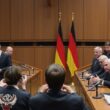A growing wave of concern is sweeping across Germany as reports of far-right incidents in schools proliferate, according to a recent Forsa survey commissioned by “Stern” and RTL. The poll reveals that a substantial 73% of German citizens express significant or very significant worry about the escalating trend, highlighting a deeply divisive issue within the nation’s political landscape.
The survey data paints a stark contrast between supporters of the Alternative for Germany (AfD) and those aligned with other political parties. While anxieties surrounding the rise of extremism consistently register above 80% among followers of nearly every established party, less than half of AfD supporters express comparable levels of concern. This divergence underscores a worrying chasm in the perception of the threat posed by far-right ideologies.
Further exacerbating the division is a fundamental disagreement on the role of teachers within the education system. The survey found that only 9% of respondents believe “political neutrality” for educators equates to complete silence, even in response to anti-constitutional student viewpoints. This figure jumps to a jarring 24% among AfD supporters, demonstrating a stark difference in understanding of the responsibility teachers hold.
The AfD has long championed the slogan “Neutral Schools” advocating for absolute political silence from educators. While citing the principle of state neutrality, the party frequently overlooks its crucial limitations. While civil servants are prohibited from aligning with specific political parties, they are fundamentally obligated to uphold the principles of the democratic constitutional order. Furthermore, state education laws explicitly require teachers to impart and defend democratic values – a responsibility often downplayed or ignored by the AfD.
This mandatory commitment to defending democratic norms finds little support amongst a significant portion of AfD voters. Only 5% of respondents believe this obligation is incorrect, a proportion that swells to 14% amongst those supporting the AfD – nearly three times the national average. Furthermore, 12% declined to comment on whether teachers should actively promote democratic values in the classroom, adding to the overall impression of a growing ideological fracture within German society. The findings raise critical questions about the future of German education and the potential normalization of anti-democratic views within the country.





